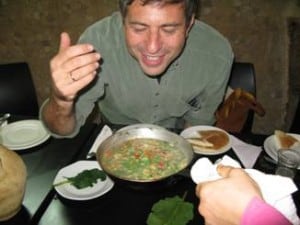by Dr. Jeremy Benstein, The Heschel Center, Tel Aviv
 This coming fall, November 2-7, 2011, the Heschel Center for Environmental Learning and Leadership, together with Hazon, will be hosting the second Israel Sustainable Food Tour. This exciting program is a unique way for North American Jews who are passionate about sustainable food to be exposed to the rapidly developing field of sustainable food in Israel. It is also an important opportunity for Israeli activists to meet likeminded counterparts and hear about their experiences, successes, challenges, insights and inspiration.
This coming fall, November 2-7, 2011, the Heschel Center for Environmental Learning and Leadership, together with Hazon, will be hosting the second Israel Sustainable Food Tour. This exciting program is a unique way for North American Jews who are passionate about sustainable food to be exposed to the rapidly developing field of sustainable food in Israel. It is also an important opportunity for Israeli activists to meet likeminded counterparts and hear about their experiences, successes, challenges, insights and inspiration.
Since Heschel’s original National Sustainable Food Conference a little over a year ago, which attracted 600 people with 40 roundtables and working groups, we have been working to create a coalition of people and organizations who are interested in promoting sustainable food in its myriad guises and contexts. We have been meeting with farmers, academics, government officials, health and nutrition experts, consumer policy groups, educators, nutritional security advocates and more to create the connections necessary to promote a shared agenda backed by leading stakeholders from all sectors.
This past month, we held a two-day summit workshop for 20 key activists and the range of existing initiatives is already striking. We heard about projects such as Tafrit Mekomi (“Local Menu”) in the Central Galilee, connecting organic Israeli Palestinian farmers with food co-ops in places like Carmiel; Ethiopian community gardens and activism in Gedera; Bedouin women in the town of Hura in the Negev, forming a cooking cooperative to prepare healthy local meals for the afternoon school program (11 women making 3000 meals a day!), and a major legislative bill that will mandate the formation of a national food council, to monitor issues of health standards, and social, economic and environmental impacts of food production and consumption.
On the 2011 Food Tour, we will visit some of these impressive projects as well as explore key issues, meet central players in the sustainable food scene and more.
- Glean surplus produce from fields, participating in one of the many inspiring food rescue projects of the Leket / Table to Table non-profit featured on Jew and the Carrot.
- Learn about “bio-falcha” (combination of modern ecological with traditional growing methods for field crops) at the sustainability education center and farm, Hava Ve’adam in Modi’in.
- Take an insider’s tour of Machaneh Yehuda, the storied open air shuk in Jerusalem — where rugelach and kibbe, arak and espresso live side by side – and see and taste things you will never find there, in a behind-the-scenes look at the newly founded farmer’s market of Tel Aviv/Jaffa such as Shuk Hanamal.
- We will have the opportunity to imbibe some new-old wisdom, through Talia Schneider’s unique brand of kabbalistic permaculture.
- Visit Israel’s leading organic dairy, which also is an outstanding social venture, by employing youth at risk. By the way, they also have a fantastic vegan restaurant.
- Sample some of the spice and spirit of the Galilee, meeting visionary Avi Zithershpieler, and his Derech Hatavlinim, the sense-boggling Herb and Spice Farm.
- Tour Kibbutz Lochamei Ha-Ghetta’ot, home of mega-food manufacturer, Tivall Products, exploring the implications of processed soy meat alternatives.
The emphasis in this tour is on the social and environmental aspects of sustainable food from farm to fork. We will explore obstacles and opportunities regarding Israeli Arab Agriculture and food issues, the promise of the growing the organic agriculture market in Israel and other cutting edge issues. And we will also eat extraordinarily well, sampling the rich array of local, multi-ethnic, indigenous, fusion and more, that make up Israeli foodways.
What is sustainable food? We have defined it simply as “healthy food for all”:
- Healthy – for people and the planet, for body and soul
- food – real food, not edible food-like substances
- for all – affordable, accessible, a right not merely a commodity
This may sound wild-eyed and radical to some, and like the most basic of basic common sense to others. But, in Israel, where fresh fruits and vegetables are available even in poor communities and all food grown in the country is pretty much local, even the government identifies with that vision. The stated goal of the Ministry of Agriculture, framed in their recent strategic plan, is to promote sustainable agriculture, which is “multi-functional and multi-purpose agriculture, which produces and supplies fresh, healthy, quality, and varied food, at reasonable prices throughout the year, together with environmental values and values expressing the relationship between people and the earth. This means adopting a multi-generational view of resources and means, and preserving them for future generations.” Now, this is still the vision, not yet the reality, but we’re working on it — and we invite you to come see for yourselves.
Apply Now for the 2011 Israel Sustainable Food Tour
Dr. Jeremy Benstein is a Deputy Director of the Heschel Center and director of the Environmental Fellows program. He holds a PhD in environmental anthropology from the Hebrew University of Jerusalem. Jeremy’s interests focus on the interplay of religion, culture and values with the environment, topics he has explored in his book The Way Into Judaism and the Environment.




No comments yet.